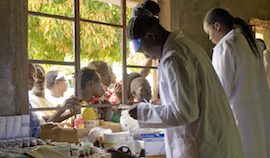WDI Paper: Unclogging Finances, Improving Vaccine Flow
Tuesday, June 14, 2016
A supply chain is only as effective as the last mile. That’s why an adequate and reliable flow of funding all the way to the point of care, also known as the “last mile,” is vital to an effective immunization supply chain. A new WDI policy paper examines how financial structures can impact vaccine supply chains and also highlights tools for improvement.

The paper, “Delivering the Money: The Importance of Efficient Financial Flows for Vaccine Distribution,” complements a new study by VillageReach and UNICEF identifying key financial barriers preventing or delaying vaccines from reaching the last mile. Because of WDI’s broad experience in global supply chain issues from its work on many projects around the world, VillageReach asked if the Institute would conduct a full review of the literature and desk research for a policy paper to accompany its study, which focuses on conditions in Mozambique.
The paper is the sixth in a series produced by VillageReach to develop intellectual capital for increased access to essential medicines, vaccines and other health technologies in developing countries. Additional papers in this series consider the different components of the supply chain, the challenges faced at the last mile for distribution, and examples of innovative approaches to address those challenges.
“The purpose of our policy paper is to take some of the work they’re doing in Mozambique and apply a more global context to it,” said author Michael Krautmann, a WDI research associate specializing in healthcare supply chains. “Are other countries experiencing similar problems as well? What are other countries doing to address these issues within the context of global health?”
Krautmann, along with Maria Joachim, a PhD candidate at the University of Michigan School of Public Health and WDI research assistant, extensively reviewed the literature on public financial management as a concept from sources such as the World Bank and the International Monetary Fund. But when it comes to how public finance successfully intersects with public health, the team discovered a dearth of research.
“We focused on condensing the literature that was available to provide a realistic path forward for these vaccine managers in the districts, the ones who face these issues,” Krautmann said. “We tried to address what vaccine managers can do to improve the flow of funds for vaccines in spite of whatever financial management issues they may face.”
A couple of recommendations include advocating at all levels of government for distribution support and budget clarity, and measuring and tracking distribution costs.
In addition to targeting the on-the-ground managers, Krautmann said the paper’s other audience includes global and national-level donors and policymakers, “who may be focused on problems higher up in the global health supply chain.
“This paper hopes to highlight the issue of efficient last-mile financial flows so it can be put on the global healthcare agenda and ultimately addressed,” he said.
Photo courtesy of U.S. Army Africa Public Affairs.
